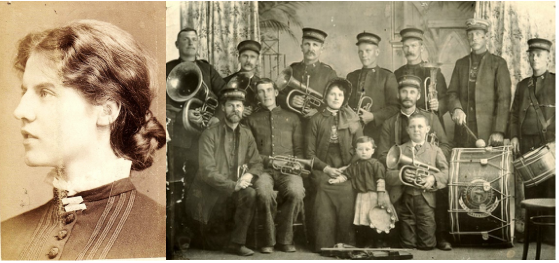One day a French Baron, who had received a great blessing at the Maréchale’s Conferences, said to her, “What you lack here is pictures; for instance, the saints. Those beautiful faces, with their sweet celestial expressions, diffuse a sentiment of reverence and quietness, and they would form such a beautiful background to you. You should have the Virgin, and Saint Francis, and many others. That is what you lack in all your halls: could we not do something?”
“Baron,” said the Maréchale, “will you come here next Sunday evening?”
“Yes, certainly. Are you going to speak?” He never lost a chance of hearing her.
“Yes; be sure you do not miss it.”
On Sunday evening the Maréchale marshalled her little group of officers in to the Hall. She filed them in, men on one side, women on the other. She stood in the midst of them, and spoke. At the end of the meeting the Baron came forward. “Maréchale,” he said, “you have no need of pictures. Those figures! Those faces! They are your pictures.”
Her friend, Frank Crossley, was greatly struck by this incident. He wrote: “I was specially interested in the remark upon inspired faces. I once heard Rendel Harris, a great Bible scholar and collector of Biblical scripts, say that Bible critics might tear the volume [written work] into shreds, but they could never rub off the light of God from the faces of His people.”
The Maréchale once wrote, “We are sometimes told that our uniforms, our young women speaking in public, our tambourines and our processions bring contempt upon religion. It is a mistake. That which is the laughing-stock of the world and of Hell is a religion without sacrifice. People will never believe in Christians who, while professing to be disciples of Him who had not where to lay His head, live in luxury, seek first the comfort of their family, the health and position of their children, and let their souls perish for lack of that Gospel which they profess to believe. There is the secret of the unbelief of France; that is what makes the young who are in search of truth cry, ‘Comedy!’ On the other hand, those faces which radiate the light from on high, those young people who rise up to give themselves to God instead of the world, those men and women who declare, with a sincerity which leaves no room for doubt, that they consecrate their life to God for the saving of souls, are more eloquent than the most beautiful discourses.”
A well-known socialist of the time, who greatly admired the Maréchale, wrote of the Salvation Army, “I confess that I find it remarkable that among these young girls, pretty as well as plain, is the complete absence of the ordinary feminine expression. . . In looking with searching, scrutinizing eye at the faces enveloped in this ugly bonnet, we have not deciphered the least vestige of this expression, neither timidity, nor awkwardness, nor restlessness, nor the consciousness that people are thinking of them. Nothing. These faces are the free faces of free creatures.”

 RSS Feed
RSS Feed